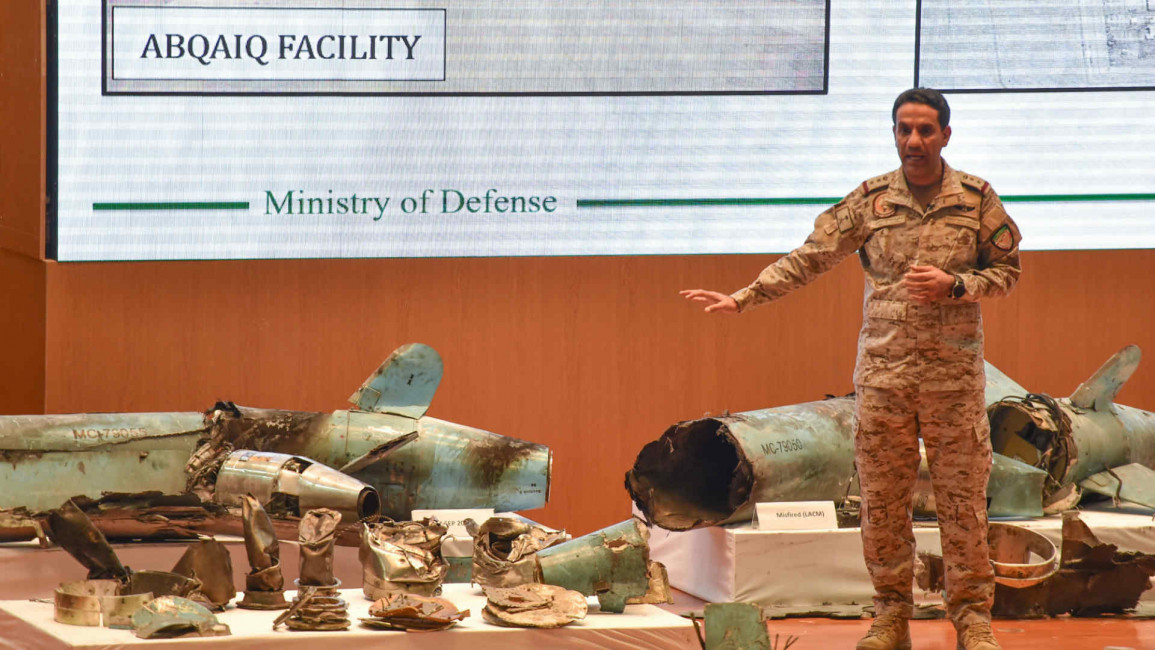Saudi Arabia blames Iran for Aramco drone, missile strikes but avoids naming launch site
Speaking at a press conference in the capital Riyadh on Wednesday, a spokesperson for the Saudi-led coalition in Yemen refuted claims that the weapons were directed at Saudi Arabia from its southern neighbour Yemen.
Using intelligence he said Saudi Arabia had gathered after Houthi-claimed drone strikes on a key oil pipeline in the kingdom earlier this year, spokesman Turki al-Maliki said Saturday's stikes had "unquestionably" been directed from the country's north.
"We are working to know the exact launch point," he explained, refusing to pinpoint a potential launch site for the attacks with any further details.
To evidence the kingdom's argument, Maliki used a display of Unmanned Aerial Vehicle (UAV) and cruise missile parts he said were uncovered at the sites of the Abqaiq and Khurais attacks.
Eighteen UAVs, or drones, were directed at the Abqaiq - the largest crude oil stabilisation facility in the world - and a total of seven cruise missiles were launched towards Khurais, which hosts a large oil field, Maliki said.
Journalist Adam Rawnsley said on Twitter that one of the UAVs exhibited by Saudi Arabia at the press conference appeared to be one of the IRGC's Shahed drones.
The manufacture date on another indicated it was a prototype of a drone announced by Iran earlier this year, Maliki added.
Three of the cruise missiles directed at Khurais misfired, enabling the Saudi authorities to investigate their capabilities and programing.
UAV parts found at Abqaiq have also been used in the Saudi investigation, the spokesman explained.
The attacks indicated the use of technology with "advanced capabilities beyond that of Iranian proxies" such as the Houthis, Maliki said.
|
|
"The attack could not have originated from Yemen," he said.
The estimated range of Iranian-produced UAVs and cruise missiles, according to data gathered by the kingdom after previous drone attacks, ruled out that possibility, alongside indications at the site that the attack had come from the north rather than the south.
US officials have said that they attacks were perpetrated by Iran, with recent reports indicating they believe the drones and missiles were launched from an Iranian base in the Islamic Republic but close to the Iraqi border.
The Saudi spokesman also claimed the "Iranian-sponsored" attack was not just a strike on the state's oil facilities.
"This attack was not [just] to attack Saudi Aramco or the kingdom of Saudi Arabia, but to attack the world economy," he said.
The spokesman went on to to say that Iran's "support of terrorism" affected the whole world, referencing the country's backing of militias in Iraq, Syria and Yemen.
Saudi Arabia also considers Saturday's attack as an attack on civilians, Maliki said.
"The Iranian regime is attacking civilian infrastrucuture," he said, claiming that civilian "objects and infrastructure" were hit during the Abqaiq and Khurais updates, putting workers' lives at risk.
"It is the responsibility of the whole international community to stop Iran," Maliki urged.The coalition spokesman clarified that Saudi Arabia was still working to pinpoint the launch site of the attack but would provide evidence about its findings once the investigation was closed.
When asked whether the kingdom's response to the attacks would be a military one, Maliki simply replied that it was "not my decision".
US President Donald Trump announced earlier on Wednesday that he was seeking to impose further sanctions on Iran over the strikes.



